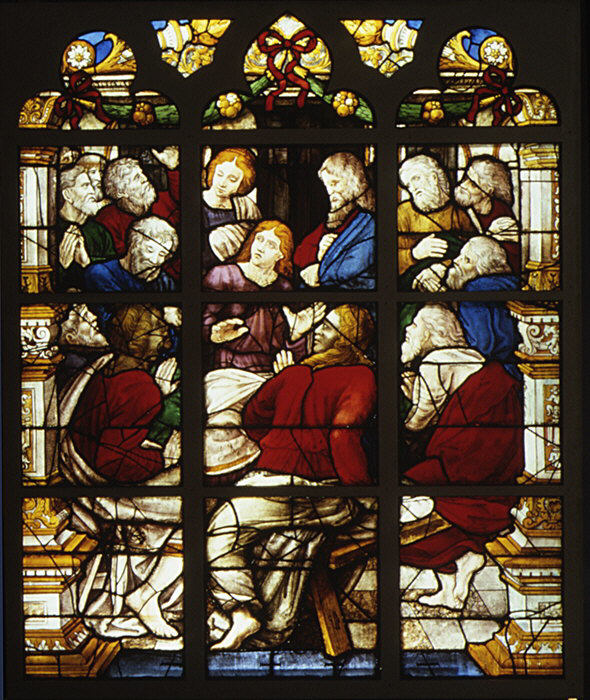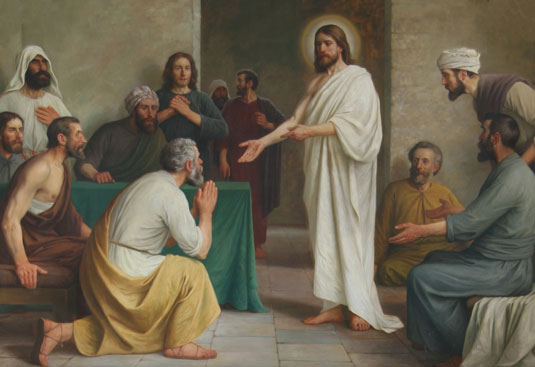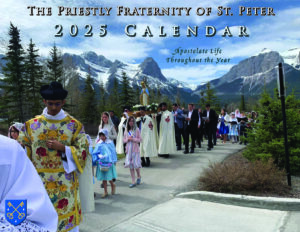Peace of Mind Part 1
It probably is not very difficult to put ourselves in the place of the eleven Apostles in the two days immediately following our Lord’s crucifixion and burial.
At no other time in the Gospel do we see a more flawed, pathetic, broken, imperfect, and (dare we say) human group of men. These were the chosen ones of our Savior, the men He lovingly called His intimate friends (not His servants). To them much was given and, rightfully, much should have been expected. So their incredible failure to rise to expectations during the Passion left them with much to think about.
 Enough time had now passed to allow them at least some reflection to those last events of Christ’s life, on their behavior at His arrest which likely had surprised them. Perhaps it was the topic of discussion separated by long intervals of embarrassed silence. Maybe some of them had a hard time looking at St. John who, of them all, managed to follow Christ and stand at the foot of the Cross; maybe some were upset at Peter, whose personal boast of fidelity to Christ at the Last Supper led them all to make similar boasts; perhaps some thought of our Lady, the tremendous sorrow she experienced, and how they abandoned her along with our Lord.
Enough time had now passed to allow them at least some reflection to those last events of Christ’s life, on their behavior at His arrest which likely had surprised them. Perhaps it was the topic of discussion separated by long intervals of embarrassed silence. Maybe some of them had a hard time looking at St. John who, of them all, managed to follow Christ and stand at the foot of the Cross; maybe some were upset at Peter, whose personal boast of fidelity to Christ at the Last Supper led them all to make similar boasts; perhaps some thought of our Lady, the tremendous sorrow she experienced, and how they abandoned her along with our Lord.
They must have mulled over all the things Christ said and did the past three years, recalling all the incidents and miracles, those quiet evenings when He taught them the meanings of the parables, how He always displayed command over every situation, yet now utterly baffled by a such a dramatic change of events when all power seemed to abandon Him. How then to reconcile all that with the strange news that Christ had been seen risen and alive, cautiously recalling His words that He would rise again on the third day.
And through the myriad of emotions and confusion lay this most profound disappointment in themselves for not being better than they were, for not rising to the occasion when our Lord needed them most, perhaps then wondering that, if it indeed is true that Christ was risen, what kind of reception – if any – should they expect from Him. The locked doors of that Upper Room where they now sat in fear, that same room where forty-eight hours earlier Jesus Christ established the priesthood, ordained them bishops, and gave them the Holy Eucharist for the first time, were indicative of hearts locked in turmoil, yet so desiring resolve.
 But those locked doors were no match for Christ, and so it certainly took the Apostles by surprise when He appears before them and, amidst many things He could have said, He announces Peace. Not a shred of disappointment, anger, or sadness in our Savior’s tone, something they all knew they deserved. Rather, it was a salutation that read right into the turmoil of their hearts, that acknowledged their weakness, that forgave their failure, and would dispose them to the new life He came to bring and to undertake the mission He was about to bestow. With one word, the air was cleared: that same word our Lord used two years earlier to calm the storm at sea, He now uses to calm the storm in their souls. It would be the first word of the Resurrected Christ to His Church: Peace. And in this one word did our Lord sum up all of His teachings and commandments about how to attain eternal life, about how to possess true happiness, teachings put to the extreme test of the Crucifixion, found to be all that is good and true, and validated by the Resurrection. By greeting the Apostles with this word, our Lord – now Resurrected while bearing the scars of the Crucifixion – insists that He alone is the basis of true and lasting peace. But why?
But those locked doors were no match for Christ, and so it certainly took the Apostles by surprise when He appears before them and, amidst many things He could have said, He announces Peace. Not a shred of disappointment, anger, or sadness in our Savior’s tone, something they all knew they deserved. Rather, it was a salutation that read right into the turmoil of their hearts, that acknowledged their weakness, that forgave their failure, and would dispose them to the new life He came to bring and to undertake the mission He was about to bestow. With one word, the air was cleared: that same word our Lord used two years earlier to calm the storm at sea, He now uses to calm the storm in their souls. It would be the first word of the Resurrected Christ to His Church: Peace. And in this one word did our Lord sum up all of His teachings and commandments about how to attain eternal life, about how to possess true happiness, teachings put to the extreme test of the Crucifixion, found to be all that is good and true, and validated by the Resurrection. By greeting the Apostles with this word, our Lord – now Resurrected while bearing the scars of the Crucifixion – insists that He alone is the basis of true and lasting peace. But why?
This all depends upon what is meant by peace. Christ emphasized through His life that the peace He brings is not what the world desires or expects (cf. Jn. 14:27). The spirit of the world has no use for the peace Christ offers, and that is precisely why our Lord says in this regard that He did not come to bring peace but the sword, (Mt. 10:34) that He will be cause of division in houses to the extent of putting father against son, mother against daughter, and so forth. (cf. Lk. 12:53)
Therefore, peace is not to be equated with absence of strife, nor is it to be confused with tranquility plain and simple. A thief can be quite tranquil in his stolen merchandise.
Rather, peace is the tranquility of order.
And since peace deals with order, it is necessarily related to justice, since justice entails proper respect of order. It was only after the infinite injustice of sin against God was requited by Christ’s crucifixion could there be an affirmation of true peace; it was impossible otherwise. Jesus Christ came to restore the order that had been upset by sin, which caused man to be at enmity with God, and to extend to us through His Church a real participation in the continued restoration of that order until the end of time.
So in extending peace, Christ was extending and establishing Himself as the only source of true peace between man and God, our fellow neighbor, and within ourselves.
April 16, 2021








